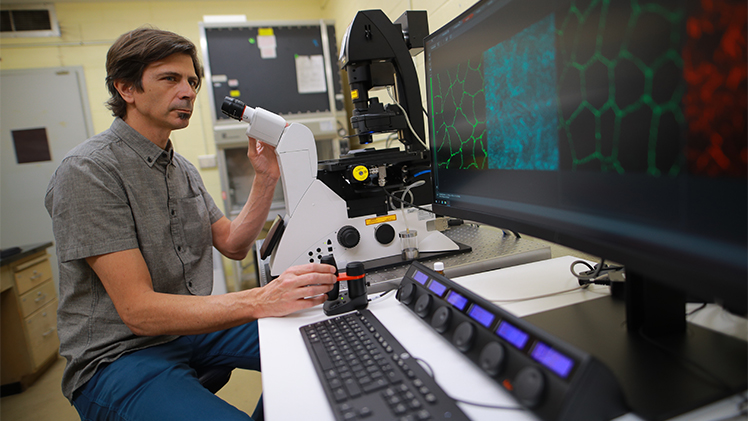Dr. Rafael Garcia-Mata, associate professor and Harold C. and Charlotte L. Shaffer Chair in Biological Sciences, was the top researcher selected to receive the 2020 STELLARIS Award for his lab.
Researchers from laboratories nationwide were eligible to apply for the award, in which one lab would receive a new STELLARIS confocal microscopy system from Leica Microsystems. With its advanced hardware and software that deliver brighter signals and more detailed images, the STELLARIS system is valued at approximately $400,000.

An independent panel of judges selected Dr. Rafael Garcia-Mata, associate professor and Harold C. and Charlotte L. Shaffer Chair in Biological Sciences, and his laboratory research as the most deserving of a STELLARIS system.
Hundreds of researchers throughout the science fields applied, providing details of their research, discussing any limitations with their current imaging systems and how those constraints have affected their experiments, and explaining how their research could benefit from new cutting-edge imaging capabilities.
Garcia-Mata’s laboratory focuses on understanding the cellular processes controlled by the Rho family of proteins. Rho proteins control several aspects of cell behavior, including the organization of the cytoskeleton, cell migration, adhesion and polarity. These processes play key roles in the regulation of normal development of cells and tissues, as well as during a wide range of diseases including cancer.
An independent panel of judges selected Garcia-Mata and his research as the most deserving of a STELLARIS system based on various scoring criteria.
“We are thrilled by the prospect of how the STELLARIS platform will help advance our research,” Garcia-Mata said. “We plan to use STELLARIS to study the dynamics of small and transient cellular structures, which are dim, short-lived and harder to distinguish from the background, which makes them very difficult to image. The STELLARIS system is faster and more sensitive than traditional confocal systems, and also provides novel and sophisticated tools to collect additional data, such as fluorescent lifetime, which makes it perfectly suited for some of our projects.”
Leica Microsystems, which develops and manufactures microscopes and scientific instruments for the analysis of microstructures and nanostructures, is a market leader in compound and stereo microscopy, digital microscopy, confocal laser scanning and super-resolution microscopy with related imaging systems, electron microscopy sample preparation and surgical microscopy.
“This has been a remarkable process,” said Greg Eppink, general manager of microscopy at Leica Microsystems Americas. “This unique program was enthusiastically received by the community of life science researchers we support with our imaging solutions. We look forward to partnering with Dr. Garcia-Mata to fully explore the novel innovations of the STELLARIS platform to overcome the imaging challenges specific to his science.”